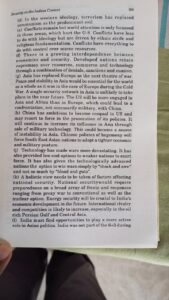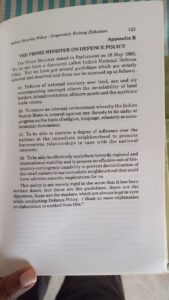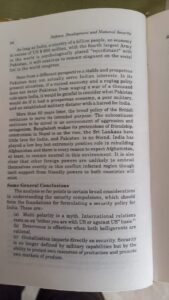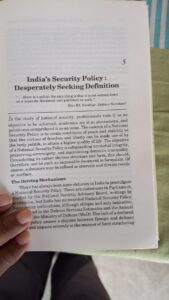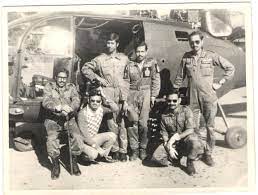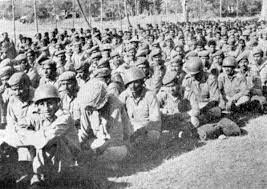News Report
Pakistan’s top security panel on 27 Dec 21, approved its National Security Policy. It is first-of-its kind document. The policy was presented and approved at the 36th meeting of the Pakistan’s National Security Committee (NSC), chaired by Prime Minister Imran Khan and attended by the Chairman Joint Chiefs of Staff Committee and all Services Chiefs. Federal Ministers for Foreign Affairs, Defence, Information, Interior, Finance and Human Rights as well as other senior civil and military officers were also present at the NSC meet. National Security Advisor (NSA) Moeed Yusuf, presented the document.
Flavour of Pakistan’s Document With Comments
During the declaration it was stated that Pakistan was shifting to a Comprehensive National Security Framework – the ultimate purpose of it being safety, security and dignity of citizens.
Comments: Comprehensive national security framework and enhancement of comprehensive national power (CNP) is the need of the hour for all the countries to deal with future challenges.
Terming the NSP’s formulation and approval a historic moment, the prime minister noted that the policy must guide all organs of the government to ensure that their efforts are synchronised with the overall direction of the NSP.
Comments: Such policy document does provide direction to all the branches of government, to synchronise their efforts and adopt a whole of government approach towards future security challenges.
The document places “economic security at the core”. According to PMO office a stronger economy would create additional resources that would in turn be judiciously distributed to further bolster military and human security.
Comments:
For Pakistan, the revival of economy is the biggest challenge at the moment. The country cannot survive in the long run purely on Credit Card model of economy.
Mention of additional resources being distributed to Military shows the mind set and fact that military still rules the roost.
It has a “citizen-centric approach to security”. Prime Minister Khan, on the occasion, emphasised that the security of Pakistan rests in the security of its citizens.
Comments: The dissent amongst the common man against the military and the ruling political parties is increasing in Pakistan. The declaration of the policy being “citizen-centric” appears to be effort to woo the common man back.
It contains countries external as well as internal challenges.
Comments: The document essentially has to include these challenges. It will be interesting to wait and watch exactly what challenges have been listed.
It was announced that the document was finalised after several rounds of feedback consultations with all state institutions, including provincial government and the governments of so called Gilgit-Baltistan and Azad Jammu and Kashmir.
Comments: No Pakistani document would be complete without the mention of K word. It would be interesting to see what the policy states about it.
Reports suggest that the policy seeks to address traditional and non-traditional threats to the country’s national security. Apart from the economic and military issues, the draft sheds light on the country’s water security as well as population growth, terrorism and foreign policy, particularly concerning the Kashmir and Afghan issues and relations with other countries in the region and beyond.
Comments: A comprehensive policy document needs to include all the possible security challenges.
The document also emphasises the need to avoid participating in bloc politics.
Comments: It is easier said than done for Pakistan. It has already become a vassal state of China. It also realises that it cannot rely on China, USA and Middle East Islamic bloc counties in the long run, as these relations are purely need based for them.
Inter-Services Public Relations (ISPR) Director General Maj Gen Babar Iftikhar said the policy was an important milestone in strengthening Pakistan’s national security. “The comprehensive framework recognises inter linkages between various strands of national security, imperative to meet emerging challenges in [the] evolving global environment through a whole of government effort,” he said, “Pakistan’s armed forces will play their due part in achieving the vision laid out in the policy.”
Comments: Reading in between the lines it conveys that the Pakistan military supports the document and will monitor and assist its implementation so long as the military gets its share.
“We are an Islamic state and have the vision of an Islamic state. The policy will cover all aspects of diversity within that realm,” Yusuf added.
Comments: Like the K word, any Pakistani document has to have the mention of being champion of Islamic cause. However, it is selective as proven by their silence on the Uyghur Muslim’s plight.
The Process & Implementation
The NSP has been created through a whole-of-government effort over the last seven years, and included extensive consultations among federal government institutions, with all provinces, and with the academia and private sector, NSA Yusuf said at the meet. This was followed by consultations with over 600 academics, analysts, civil society members and students across Pakistan to make the policy process inclusive, he maintained.
Comments: The process has to include all the stake holders. However, there would be lot of disagreements and difference of opinions. Not with standing these the document needs to be formulated keeping national interests in mind.
However, the country’s opposition leaders have criticised the government for ignoring the Parliament while formulating the policy. Pakistan People’s Party leader Farhatullah Babar questioned the authority of a “few uniformed and non-uniformed individuals” to formulate a policy “for an impoverished nation of 220 million armed with nuclear weapons.” He said the document was never debated in the Parliament, rubbishing the government’s claim that all stakeholders were consulted.
Comments: The document should not become a tool for political gimmicks. This could be one of the reasons why such a policy document is not seeing the day light in India.
It was highlighted that a detailed implementation framework had been created through which the National Security Division would review progress in collaboration with relevant ministries and departments. PM instructed the National Security Adviser to present an implementation progress report to the NSC every month.
Comments: Implementation is as important as formulation of the policy document. It has to be Top driven initially.
Its validity is for 2022-26. “The policy is expected to be a dynamic document which will be reviewed each year and on the transition of government to help keep the National Security Policy abreast with policy priorities in a fast-changing global environment,” Moeed had said.
Comments: The document has to be dynamic, with periodic reviews to adapt to the changing challenges and environment. USA has promulgated about 17 documents in three decades.
Yusuf told media persons that while the policy draft was a classified document, a public version of it would be finalised and launched by Prime Minister Imran Khan within seven to 10 days.
Comments: Making the document in two parts (classified and open to public) makes sense and has its benefits.
Bottom Lines
The Pakistan’s National Security Document has following prominent Flavours.
- Economic revival is the core issue.
- Common man is being wooed.
- Military rules the roost and will support implementation so long its interests are looked after.
- The country continues to Harp on being Champion of Islamic cause.
- Obsession with K word continues.
Question
When will India’s policy document see the day light (if at all)?
Link to Article: National Security Strategy / Policy Document
Suggestions and value additions are most welcome
For regular updates, please register here
References

